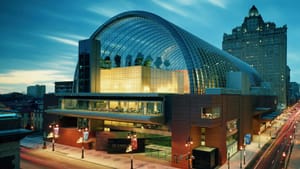Stay in the Loop
BSR publishes on a weekly schedule, with an email newsletter every Wednesday and Thursday morning. There’s no paywall, and subscribing is always free.
What do Philly and Spokane have in common?
Has Philadelphia become a cultural backwater?

Some people think of Dubuque as the quintessential culturally isolated city; I imagine Spokane. It’s probably a nice town, but no one seems to visit it. The same is true in Philadelphia.
Broadway shows used to come here for their tryouts, which meant you could see some top talent. Not nowadays. Nor, with a couple of exceptions, do name artists show their work in Philadelphia galleries. If you’re a native of the city, it’s a place to get away from. You might come back, like Bill Cosby (ouch!) or Kevin Bacon, to give it at a pat on the back. On the whole, though, you’ll side with W. C. Fields.
This is not to suggest that there aren’t gifted performers who make their careers in Philadelphia, and even, in thinking of the city’s much-abused crown jewel, the Philadelphia Orchestra, world-class ones. But cities that aspire to anything beyond provincialism have one thing in common: They not only nurture talent, they attract it. And they get other cities to share their own best with them. The mark of provincialism is to be satisfied with oneself. The best cities — not necessarily the biggest — want to see what the competition has to offer, and be challenged by it.
Mission shrink
That is why Peter Dobrin’s recent Inquirer column should get people thinking. He pointed out that, under current management, the Kimmel Center has retreated from its original mission as a magnet for the best musical talent in the world and has settled for shortchanging its own indisputable asset, the Philadelphia Orchestra, in a hall that will never give it the sound it deserves. (You could argue that, with its long entrapment in the Academy of Music, the Orchestra has never actually been heard in the city whose name it bears.)
Still, something is better than nothing, and the New York Philharmonic has suffered through its own half century of purgatory in Avery Fisher Hall. Major visiting orchestras will come to Philadelphia — they just aren’t asked. This was not the case when the Kimmel opened, and, for the first time, the city drew ranking ensembles on a regular basis.
No longer. Orchestras are expensive, and the current Kimmel management, perhaps encouraged by the Orchestra’s bankruptcy and the clear signal it gave that the city’s elites expect cultural venues to pay for themselves, has pulled in its horns and decided to settle for lighter and cheaper fare. Dobrin might also have mentioned the Annenberg Center, which occasionally hosted a visiting orchestra, or a troupe like the Abbey Theatre, but which now concentrates almost entirely on pop artists.
The sounds of silence
The result is, sitting between the national capital in Washington and the world capital, New York, Philadelphia might just as well be — well, in eastern Washington State. Even the Pittsburgh Symphony, widely welcomed elsewhere, doesn’t call.
Meanwhile, the Philadelphia Orchestra certainly travels. You can read all about its triumphs in foreign capitals in the Inquirer and imagine the notes for yourself. The Philadelphia Chamber Music Society has pulled up stakes for the season, too. June is here. July and August await us.
Well, there’s still the Phillies.
Enough said.
Sign up for our newsletter
All of the week's new articles, all in one place. Sign up for the free weekly BSR newsletters, and don't miss a conversation.

 Robert Zaller
Robert Zaller